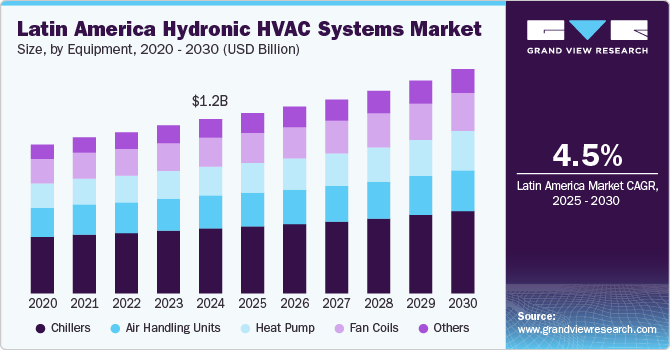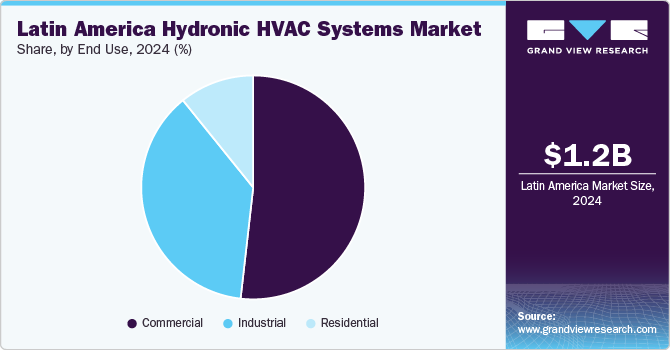- Home
- »
- Advanced Interior Materials
- »
-
Latin America Hydronic HVAC Systems Market Report, 2030GVR Report cover
![Latin America Hydronic HVAC Systems Market Size, Share & Trends Report]()
Latin America Hydronic HVAC Systems Market Size, Share & Trends Analysis Report By Equipment (Heat Pump, Air Handling Units), By End Use (Residential, Commercial, Industrial), By Country (Mexico, Brazil), And Segment Forecasts, 2025 - 2030
- Report ID: GVR-4-68040-497-9
- Number of Report Pages: 152
- Format: PDF, Horizon Databook
- Historical Range: 2018 - 2023
- Forecast Period: 2025 - 2030
- Industry: Advanced Materials
Market Size & Trends
The Latin America hydronic HVAC systems market size was estimated at USD 1.23 billion in 2024 and is projected to grow at a CAGR of 4.5% from 2025 to 2030. The industry is experiencing steady growth as the region increasingly embraces energy-efficient and environmentally sustainable building technologies. Hydronic systems, which use water or a water-based solution to transfer heat, offer significant advantages in terms of energy efficiency, comfort, and reduced environmental impact, making them increasingly popular in commercial, residential, and industrial applications across Latin America.

Rising urbanization, coupled with rapid infrastructure development, has led to an increasing demand for advanced building technologies. Hydronic systems, known for their energy-saving capabilities and ability to provide consistent and uniform temperature control, are seen as an ideal solution for new buildings.
Drivers, Opportunities & Restraints
The industry is also being driven by the growing middle class in countries like Brazil and Argentina, where there is an increasing demand for modern, sustainable buildings. Hydronic HVAC systems are seen as a long-term investment due to their lower operating costs and reduced environmental footprint compared to conventional air-based systems. In addition, the region's growing awareness of the importance of energy efficiency and sustainability is fostering the adoption of more environmentally friendly technologies.
These systems require a significant upfront investment compared to traditional air-based HVAC systems, which can be a barrier for some consumers and businesses and a considerable restraint on industry growth.
As governments in Latin America increasingly prioritize energy efficiency and environmental sustainability, hydronic HVAC systems, known for their energy-saving benefits, align well with these goals. The implementation of stricter building codes and regulations promoting energy-efficient technologies presents a significant opportunity for the market.
Equipment Insights
As countries in Latin America look to reduce their carbon footprints and meet international climate commitments, the adoption of energy-efficient technologies like heat pumps is expected to acquire more traction over the forecast period. Heat pumps use electricity to transfer heat rather than generate it through combustion, making them more environmentally friendly and a cleaner and more lucrative alternative to traditional solutions in light of the overarching scenario.
The chillers segment led the market in 2024, accounting for 37.3% of the revenue share. The region’s climate and food and beverage industry drive the demand for chillers. Chile has diverse climatic conditions, from the arid Atacama Desert to the colder southern regions. These hot climatic conditions require a chiller system for both air-cooling purposes and heating purposes. Furthermore, the ongoing urbanization and rising investments in commercial and industrial buildings are driving the chillers market in Latin America.
End Use Insights
The surge in commercial construction in Latin America, including the development of shopping malls, office spaces, and hospitality venues, is significantly fueling the demand for sophisticated chillers and fan coils. This uptick is attributed to the need for energy-efficient and environmentally sustainable climate control solutions that can ensure comfortable and healthy indoor environments for occupants.

The industrial segment held a 37.4% market share in 2024. Industrial hydronic HVAC systems play a crucial role in maintaining the optimal functioning of machinery and equipment that operate under specific environmental conditions, as well as facilitating certain industrial processes that generate significant heat, which must be effectively removed.
Country Insights
The market in Brazil is expected to expand at A CAGR of 4.8% over the forecast period owing to the increasing urbanization and the rapid expansion of commercial and residential infrastructure. As cities grow, there is a greater demand for efficient, sustainable building solutions, and hydronic systems fit well into this trend due to their energy efficiency and environmental benefits. Brazil’s growing emphasis on sustainability and energy efficiency is prompting businesses and local governments to adopt technologies that help reduce energy consumption and carbon emissions. Additionally, Brazil’s fluctuating climate, which can range from hot to cold, creates a need for systems that provide reliable, efficient heating and cooling, making hydronic HVAC systems particularly suitable for these varying conditions.
Mexico Hydronic HVAC Systems Market Trends
The market in Mexico accounted for a 26.3% share in 2024, driven by a combination of increasing construction activity, a rising focus on energy efficiency, and climate considerations. As Mexico continues to urbanize and its middle class expands, there is a growing demand for modern, energy-efficient building solutions in both residential and commercial sectors
Key Latin America Hydronic HVAC Systems Company Insights
Some of the key players operating in the market include HILLENBRAND UK and KraussMaffei.
-
Carrier provides healthy, safe, sustainable, intelligent building, and cold chain solutions. The company’s business segments include refrigeration, HVAC, and fire & security. Arcoaire, Beretta, Bryant, Carlyle, Comfortmaker, CIAT, Day & Night, Heil, Keeprite, and Payne are some of the prominent HVAC brands of the company.
-
DAIKIN INDUSTRIES Ltd. manufactures and sells air conditioning systems and chemical products. The company owns 313 consolidated subsidiaries worldwide and offers air-conditioning systems, room heating & heat pumps, hot water supply systems, room air conditioning systems, packaged air-conditioning systems, and air conditioning systems for plants, facilities, and office buildings.
Key Latin America Hydronic HVAC Systems Companies:
- Carrier
- DAIKIN INDUSTRIES, Ltd
- Johnson Controls Inc.
- Lennox International, Inc.
- Trane
- Samsung Electronics Co., Ltd.
- LG Electronics
- Mitsubishi Corporation.
- Robert Bosch GmbH
- Panasonic Holdings Corporation
- Fujitsu
- Midea
- Aermec
- Rhoss
- Clivet
- Rheem Manufacturing Company
Recent Developments
-
In January 2024, LG Electronics revealed the launch of a new production line for scroll compressors at its facility in Monterrey, Mexico. This line will enhance LG’s manufacturing capabilities for scroll compressors, allowing the company to increase the output of its recognized eco-friendly products and streamline the supply chain for customer service across North America.
-
In June 2024, Alliance Air, a subsidiary of Daikin Applied, developed a new energy-efficient manufacturing facility in Tijuana, Mexico, aimed at supporting the growth of sustainable data centers throughout North America. This investment of USD 121 million encompasses a 460,000-square-foot space and is projected to create over 1,000 production jobs in the northwestern region of Mexico. The construction is expected to be completed by Spring 2025, with production scheduled to commence in June 2025.
Latin America Hydronic HVAC Systems Market Report Scope
Report Attribute
Details
Market size value in 2025
USD 1.27 billion
Revenue forecast in 2030
USD 1.58 billion
Growth Rate
CAGR of 4.5% from 2025 to 2030
Base year for estimation
2024
Historical data
2018 - 2023
Forecast period
2025 - 2030
Quantitative units
Revenue in USD million/billion and CAGR from 2025 to 2030
Report coverage
Revenue forecast, company market position analysis, competitive landscape, growth factors, and trends
Segments covered
Equipment, end use, country
Country scope
Brazil, Mexico, Argentina, Chile, Colombia
Key companies profiled
Carrier, DAIKIN INDUSTRIES, Ltd, Johnson Controls Inc., Lennox International, Inc., Trane, Samsung Electronics Co., Ltd., LG Electronics, Mitsubishi Corporation., Robert Bosch GmbH, Panasonic Holdings Corporation, Fujitsu, Midea, Aermec, Rhoss, Clivet, and Rheem Manufacturing Company
Customization scope
Free report customization (equivalent up to 8 analysts working days) with purchase. Addition or alteration to country, regional & segment scope.
Pricing and purchase options
Avail customized purchase options to meet your exact research needs. Explore purchase options
Latin America Hydronic HVAC Systems Market Report Segmentation
This report forecasts revenue growth at the regional and country levels and provides an analysis of the industry trends in each of the sub-segments from 2018 to 2030. For this study, Grand View Research has segmented the Latin America hydronic HVAC systems market report based on equipment, end-use, and country:
-
Equipment Outlook (Revenue, USD Million, 2018 - 2030)
-
Heat Pump
-
Air Handling Units
-
Chillers
-
Fan Coils
-
Others
-
-
End Use (Revenue, USD Million, 2018 - 2030)
-
Residential
-
Commercial
-
Industrial
-
-
Country Outlook (Revenue, USD Million, 2018 - 2030)
-
Latin America
-
Mexico
-
Brazil
-
Argentina
-
Chile
-
Colombia
-
-
Frequently Asked Questions About This Report
b. The Latin America Hydronic HVAC Systems Market size was estimated at USD 1.23 billion in 2024 and is expected to reach USD 1.27 billion in 2025.
b. The Latin America Hydronic HVAC Systems Market, in terms of revenue, is expected to grow at a compound annual growth rate of 4.5% from 2025 to 2030 to reach USD 1.58 billion by 2030.
b. The chillers segment dominated the market in 2024 accounting for 37.3% of overall revenue share. The demand for chillers in Latin America is growing steadily due to increasing industrialization, urbanization, and the expansion of the commercial and residential construction sectors. As industries such as manufacturing, food processing, and pharmaceuticals expand, the need for reliable and efficient cooling systems has surged.
b. Some of the key players operating in the Latin America Hydronic HVAC Systems Market are Carrier, DAIKIN INDUSTRIES, Ltd, Johnson Controls Inc., Lennox International, Inc., Trane, Samsung Electronics Co., Ltd., LG Electronics, Mitsubishi Corporation., Robert Bosch GmbH, Panasonic Holdings Corporation, Fujitsu, Midea, Aermec, Rhoss, Clivet, and Rheem Manufacturing Company.
b. The Latin America Hydronic HVAC Systems Market is driven by rising urbanization, increasing demand for energy-efficient and sustainable building solutions, and the growing need for precise climate control in commercial and residential sectors. Additionally, government regulations promoting energy efficiency and environmental sustainability further support market growth.
Share this report with your colleague or friend.
![gvr icn]()
NEED A CUSTOM REPORT?
We can customize every report - free of charge - including purchasing stand-alone sections or country-level reports, as well as offer affordable discounts for start-ups & universities. Contact us now
![Certified Icon]()
We are GDPR and CCPA compliant! Your transaction & personal information is safe and secure. For more details, please read our privacy policy.
We are committed towards customer satisfaction, and quality service.
"The quality of research they have done for us has been excellent."





